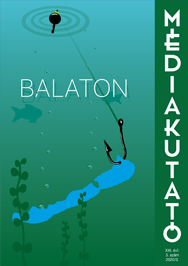Contents – Autumn 2020
Katona, Csaba:
Katona, Csaba:
Home, Freedom, Wave, Love and Ferenc Deák: The Balaton-Füredi Napló (1861–1863)
The idealised picture of spa-life in Balatonfüred is unflinching in the collective memory of Hungarians. It was as if the strenuous builders of the nation on the shores of the Hungarian sea had been working only on the progression of the country. Each spa was an enterprise operated as a well-run business that considered the comfort of the guests just as important as the maintainers' benefits from the business. The spa-society of Balatonfüred is a great and particular source for researchers to explore the embourgeoisement of the Hungarian society in the 19th century. A special memory of it is a short-lived, yet instructive press-experiment: the Balaton-Füredi Napló.
Keywords: Balatonfüred, Balaton-Füredi Napló, cultural life, embourgeoisement, 19th century, society of spa, social life, spa
Home, Freedom, Wave, Love and Ferenc Deák: The Balaton-Füredi Napló (1861–1863)
Médiakutató Autumn 2020 pp. 11-21
Sükösd, Miklós:
Sükösd, Miklós:
The technologising of the word and the realms of memory: From local oral traditions to printed national history
The influential Hungarian non-fiction writer Károly Eötvös (also a liberal politician and lawyer; 1842–1916) chose an interesting position as an author: he deliberately addressed future generations. In his major, widely read work A Journey around Lake Balaton (1900, 1909) he collected the oral traditions, true stories and family histories around the lake and sent them to the future as messages in a bottle. His work may be considered an early form of literary journalism and ethnography, and his book may also be seen as an encyclopedia of patriotism that features positive patriotic examples. As a liberal patriot, Eötvös wanted to contribute to the development of a modern, democratic Hungarian national identity that wished to integrate national minorities within the Austro-Hungarian Empire. His Balaton book invites three interpretive frameworks: Ong’s medium theory contrasting oral and written cultures, Benedict Anderson’s analysis of the co-emergence of nationalism and mass printing, and French historian Pierre Nora’s notion of the sites of memory
Keywords: Balaton, cultural memory, genius loci, liberalism, lieu de mémoire (site of memory), oral culture, print-capitalism, national identity, patriotism, written culture
Médiakutató Autumn 2020 pp. 23-43
Hermann, Veronika:
Hermann, Veronika:
What happens in Lelle
Lake Balaton plays an important part in Hungarian cultural memory and social imaginary. The rhetorical and political application of the lake has been an established practice since the early 19th century and has had a similar structure as the maturing national literature of the era. Since then, social and cultural images of the lake have been shaped by collective and individual myths, legends, anecdotes and memories. This study looks at the role of the lake in movies made under the Kádár-regime, particularly three coming-of-age stories (Pál Sándor’s Bohóc a falon [1967], András Jeles’ A kis Valentino [1979] and Péter Gothár’s Megáll az idő [1981]), each of which represents a decade under state-socialism in Hungary. It analyses how this historical context determines the image of Lake Balaton as a rhetorical figure in the popular themes of coming-of-age movies.
Keywords: cultural memory, Hungarian new-wave, mediated memory, the politics of representation, social imaginary, societal nostalgia, state-socialism
Médiakutató Autumn 2020 pp. 49-58
Trádler, Henrietta:
Trádler, Henrietta:
Bikini and Bar Behind the Iron Curtain
From the 1960s onwards, the Lake Balaton was an important tourist destination during the Kadar-regime. In order to enhance political stability, the state-socialist regime paid particular attention to improving the quality of everyday life. An important scene of the construction of “gulasch communism” was “the Hungarian Sea,” an attraction in the eyes of foreign tourists. During the period of political detente, the number of western tourists increased immensely. Balaton was the scene of reconciliation, and the articles published in the western press created the impression that there was a livable and pleasurable life behind the Iron Curtain.
Keywords: English press, image of Lake Balaton, Kadar-regime, propaganda, representation
Bikini and Bar Behind the Iron Curtain
Médiakutató Autumn 2020 pp. 59-69
Nagy, Róbert:
Nagy, Róbert:
The life and revolt of an agent at Lake Balaton: The Varga file
During the Kadar regime the lake of Balaton played key role in state-security observation. In the 1980s, in addition to monitoring people who came for vacation, the secret police invested more energy into observing members of the political opposition. The weekend houses at the lake served as spots of oppositional gatherings, and very often the producers of underground literature maintained printing-machines as well. To illustrate this, the files of a secret agent provide excellent sources. While analysing the documents, this paper asks the questions of why collaborating with the Office of States Security served the agent’s interests, whether he was efficient, and what the reactions were to his reports. It is also important to establish what extent the accounts carried the agent’s ideas and in what ways they were productions of the political regime.
Keywords: agent, cooperation, dissidents, samizdat, state-security
The life and revolt of an agent at Lake Balaton: The Varga file
Médiakutató Autumn 2020 pp. 71-84
Béresi, Ákos:
Béresi, Ákos:
Ignoring and remembering
In Balatonfüred, at the head of promenade Tagore, close to the entry of the pier, there is a strange sculpture: distressed hands turn desperately to the sky out of a wave-shaped marble-block. On the monument, a bronze memorial indicates that not very far from that sight, on May 30, 1954, a screw steamer called Pajtás crashed over. Twenty-three passangers died in the accident. This essay does not examine the conditions of the tragedy, but attempts to answer the question of why this tragic event became an integral part to the collective memory of Füred.
Keywords: accident, censorship, collective memory, Pajtás, Rakosi dictatorship, trauma
Médiakutató Autumn 2020 pp. 85-93




